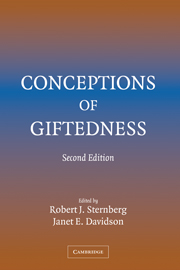Book contents
- Frontmatter
- Contents
- Preface
- List of Contributors
- 1 Gifted Education Without Gifted Children: The Case for No Conception of Giftedness
- 2 Youths Who Reason Exceptionally Well Mathematically and/or Verbally: Using the MVT:D4 Model to Develop Their Talents
- 3 A Child-Responsive Model of Giftedness
- 4 School-Based Conception of Giftedness
- 5 Giftedness, Talent, Expertise, and Creative Achievement
- 6 Permission to Be Gifted: How Conceptions of Giftedness Can Change Lives
- 7 From Gifts to Talents: The DMGT as a Developmental Model
- 8 Nurturing Talent in Gifted Students of Color
- 9 The Munich Model of Giftedness Designed to Identify and Promote Gifted Students
- 10 Systemic Approaches to Giftedness: Contributions of Russian Psychology
- 11 Giftedness and Gifted Education
- 12 The Importance of Contexts in Theories of Giftedness: Learning to Embrace the Messy Joys of Subjectivity
- 13 Feminist Perspectives on Talent Development: A Research-Based Conception of Giftedness in Women
- 14 The Three-Ring Conception of Giftedness: A Developmental Model for Promoting Creative Productivity
- 15 In Defense of a Psychometric Approach to the Definition of Academic Giftedness: A Conservative View from a Die-Hard Liberal
- 16 Creative Giftedness
- 17 Genetics of Giftedness: The Implications of an Emergenic–Epigenetic Model
- 18 The WICS Model of Giftedness
- 19 Beyond Expertise: Conceptions of Giftedness as Great Performance
- 20 Domain-Specific Giftedness: Applications in School and Life
- 21 Extreme Giftedness
- 22 Making Giftedness Productive
- 23 The Actiotope Model of Giftedness
- 24 The Scientific Study of Giftedness
- Author Index
- Subject Index
5 - Giftedness, Talent, Expertise, and Creative Achievement
- Frontmatter
- Contents
- Preface
- List of Contributors
- 1 Gifted Education Without Gifted Children: The Case for No Conception of Giftedness
- 2 Youths Who Reason Exceptionally Well Mathematically and/or Verbally: Using the MVT:D4 Model to Develop Their Talents
- 3 A Child-Responsive Model of Giftedness
- 4 School-Based Conception of Giftedness
- 5 Giftedness, Talent, Expertise, and Creative Achievement
- 6 Permission to Be Gifted: How Conceptions of Giftedness Can Change Lives
- 7 From Gifts to Talents: The DMGT as a Developmental Model
- 8 Nurturing Talent in Gifted Students of Color
- 9 The Munich Model of Giftedness Designed to Identify and Promote Gifted Students
- 10 Systemic Approaches to Giftedness: Contributions of Russian Psychology
- 11 Giftedness and Gifted Education
- 12 The Importance of Contexts in Theories of Giftedness: Learning to Embrace the Messy Joys of Subjectivity
- 13 Feminist Perspectives on Talent Development: A Research-Based Conception of Giftedness in Women
- 14 The Three-Ring Conception of Giftedness: A Developmental Model for Promoting Creative Productivity
- 15 In Defense of a Psychometric Approach to the Definition of Academic Giftedness: A Conservative View from a Die-Hard Liberal
- 16 Creative Giftedness
- 17 Genetics of Giftedness: The Implications of an Emergenic–Epigenetic Model
- 18 The WICS Model of Giftedness
- 19 Beyond Expertise: Conceptions of Giftedness as Great Performance
- 20 Domain-Specific Giftedness: Applications in School and Life
- 21 Extreme Giftedness
- 22 Making Giftedness Productive
- 23 The Actiotope Model of Giftedness
- 24 The Scientific Study of Giftedness
- Author Index
- Subject Index
Summary
Giftedness, talent, expertise, and creative achievement are inextricably linked concepts. As we seek to understand the development of abilities in youth and the rise to high-level achievement in adulthood, these concepts may guide our efforts to nurture and establish conditions for their full fruition. The purpose of this chapter, then, is to examine the basic nature of giftedness, talent, expertise, and creative achievement and their interrelationships as they affect and guide the education of gifted and talented youth and to delineate guidelines for the development of high-level and creative achievement in adulthood.
What genetic potentials and facilitative conditions combine and interact to produce expertise and/or high-level creative achievement? From exhaustive study of the lives of creative achievers, Gardner (1993) and Simonton (1997) offer some insights based on in-depth analysis of the lives of high-level, creative achievers. At first one is struck by the diversity among very high achievers: staid Albert Einstein, flamboyant Picasso, isolated Georgia O'Keefe, scholarly Darwin, and adventurous Ernest Hemingway! Are there common characteristics that might account for their genius or serve as predictors of creative achievement? Or are they too unique as examples of high-level achievement? Insights derived from research on the lives of great achievers are examined later in this chapter.
GIFTED AND PRECOCIOUS
Gifts come from people. Nature gives no gifts, but it does transmit some genetic potentials (Bouchard, 1997; Plomin, 1997; Scarr, 1997). Genetic potentials unfold in interaction with stimulating experiences structured by parents, family, home, schools, teachers, and curricula.
- Type
- Chapter
- Information
- Conceptions of Giftedness , pp. 64 - 79Publisher: Cambridge University PressPrint publication year: 2005
- 49
- Cited by

